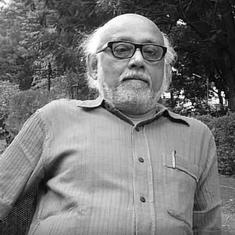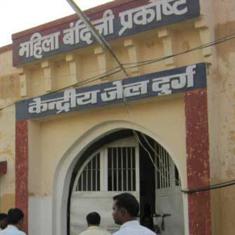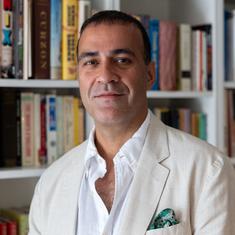When Rekha told me about Itty Cora, I found it incredible. I felt that someone had lied to her during a net chat. When I googled cannibals.com, I reached the site of a New York-based rock group. Growing suspicious, I called my friend Benny to clarify my doubts.
“You planning to write a new novel?”
“Not at the moment, but it is a possibility I can’t rule out. For now, I’m looking for details to help a teacher who is involved in a research project.”
“Well, in that case, come over. Let’s go meet Tharu master. He is about eighty-five years old. He was a physical education teacher in a boys’ school. His memory is still sharp; you just need to jog it with a little alcohol.”
When I got down from the bus in Kunnamkulam, Benny was waiting for me in his car.
“Let’s have a drink before we meet Tharu. We can buy him a bottle as well.” Benny was a tobacco merchant. He was carrying on the family business. In the darkness of the bar, I asked him, “How’s business?”
“Bad. Not like it was in the old days. The number of tobacco chewers is falling. Twenty years ago, there were nearly four hundred households that would buy at least one stack of tobacco leaves a week. Now no one buys a bunch at a time; it’s come down to a leaf or two. The sale of flavoured tobacco has all but stopped. The number of smokers is also decreasing. Now even young boys start with liquor. I survive thanks to a few old timers who still smoke and chew tobacco.”
“People are afraid of cancer.”
“Cancer? Didn’t cancer exist before? It hasn’t suddenly sprung up. Dying is just fate. You don’t get cancer just because you chew tobacco; you may get it even if you don’t.”
I didn’t agree but refrained from saying so. If I started an argument about tobacco, I wouldn’t be able to carry out my inquiries. I paid the bill and we got into the car and onto the Vadakkanchery road towards Chovvanoor.
“I heard you are writing a novel about us, the people of Kunnamkulam.”
“I am thinking about it, but haven’t started yet.”
“You must write about us. People think we deal in duplicate goods. But we are tradesmen. In trade, adjustments are necessary. We don’t cheat. We always put a price on everything. We buy stuff we can afford and when we get a higher price, we sell.”
We stopped in front of a typical Kunnamkulam Christian house with a shop in the front veranda. Business was dull. On the shelves, there were a few glass containers of gooseberries, mangoes, and white chillies pickled in brine. Soda, syrup, sweets, cigarettes, and betel leaves made up the rest of the merchandise. The old woman in the shop recognized Benny.
“Benny, how are you?”
“I’m okay. Is he at home?”
“Grandpa? He is inside. Lost in thought as usual. Who is this man with you?”
“A friend. We want to meet Grandpa.”
“Go in. He is alone.”
The room was dark. The light wasn’t switched on. Tharu master was sitting by the window reading. Despite the open windows, the walls of the neighbouring house effectively blocked sunlight from entering the room. Immersed in reading, Tharu master seemed unaware of our presence. There was a yellow bulb burning beneath a picture of Christ. After a while, he looked up.
“It’s me, Benny, the tobacco merchant.”
“Benny! You hardly ever come now,” Tharu master said as we sat down on the old couch. The old man’s eyes glinted as Benny took out a bottle. He got up and switched on the light, saying, “As I can’t go out anywhere, I’ve to wait for visitors like you for a drink.” The woman brought glasses and snacks. She warned us not to get the old man drunk and left the room. The old man’s hand trembled as he lifted the glass to his lips.
“I’ve never heard of an Itty Cora. I know that there is a ritual called Corakku kodukkal where offerings are made to Cora in the homes of the people who belong to the 18th Clan. Are you talking about the same Cora?”
“Do they belong to the schoolteacher Thandamma’s family?”
“Yes. The Syrians. They have some secrets in the family that they don’t divulge to outsiders. In other respects, their church, priests, and rituals are similar to ours.”
“I’ve heard my father say that nobody would marry their girls into the 18th Clan.”
“Yes, we don’t encourage marriages into that clan.”
“Why?”
“Well, that’s how it is. They have a secret text: The Holy Book of the 18th Clan. It’s written on palm leaves. Outsiders are not allowed to see it. The public does not know the identity of the members of this clan. I know only two or three such families; Thandamma’s is one of them.”
“Will we get information from her?” I asked eagerly.
“It’s difficult. They’ll just deny belonging to the clan.”
“How did you get to know about them?”
“It’s a sixty-year-old story. I was working as a physical education trainer in a school in Calicut. I was twenty-four, an age when blood courses passionately through your veins. This was before India became independent. There was no bus service here. So, I used to come home only once a month. My father was in the areca nut business. Each time he saw me he would harp on me to get married. But I was in love with a neighbour – a beauty named Anna. The villagers would ogle at her as she walked through the streets. She was the daughter of one of the richest men in the village. My father and I were good friends. We used to share a drink occasionally. I told him about my infatuation. He was against the alliance. When I asked him why, he told me to speak to Anna herself. I asked her and she revealed the secret.
“They belonged to the 18th Clan. They had The Holy Book of the 18thClan written on palm leaves in the house. They observed a ritual called Corakku kodukkal, offering Cora food and liquor before they allowed it to touch their lips. Cora was entitled to a share of the profits in business and a measure of the harvest. I didn’t see anything wrong with that. Then she told me that when a girl belonging to the clan came of age, she was given to Cora. I asked her whether it had happened to her, and she admitted it had.
“My love evaporated. I didn’t want to marry a girl who had been given to Cora. I think my father understood. I married Mary the next year. She died four years ago.” Tharu fell silent.

Excerpted with permission from Francis Itty Cora, TD Ramakrishnan, translated from the Malayalam by Priya K Nair, HarperCollins India.










